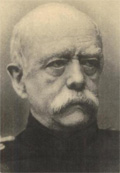The son of a German aristocrat, Otto von Bismarck studied law at the University of Göttingen (1832-1835). In 1847 he became a member of the Prussian United Diet. During the 1848 Revolutions Bismarck did not support constitutional reform but as a member (1851-1859) of the Federal German Diet at Frankfurt demanded equal rights for Prussians. He served as a foreign ambassador to the courts of Russia (1859-1862) and France (1862). Recalled in 1862 he was appointed President of the Prussian government (23 Sep 1862 - 1 Jan 1873). Bismarck helped to reorganize Germany under the hegemony of Prussia attained by means of military conflicts with Denmark (1864) and Austria (1866). The North German Confederation was established in 1867 under the Prussian supremacy. In 1870 Bismarck provoked the Franco-Prussian War and as a result was able to obtain Alsace and Lorraine from France. In January 1871 the southern German states joined the North German Confederation to create the German Empire. The German Emperor Wilhelm I appointed Bismarck as first Reich Chancellor. The government of Bismarck initiated the Kulturkampf campaign against Catholic political influence. In 1872 and 1873 it passed several laws limiting the powers of the Roman Catholic Church in Germany. On 1 Jan 1873 Bismarck relinquished the office of President of the Prussian government in favor of Albrecht Graf von Roon, but after 11 months he resumed this post (9 Nov 1873), which he occupied until 20 Mar 1890. In 1873 Bismarck negotiated the Three Emperors' League with Austria and Russia, but at the Congress of Berlin in 1878, he forced Russia to abandon some of its recent diplomatic gains in the Balkan Peninsula. Germany formed the Dual Alliance with Austria (1879), which required the two countries to stand together in case of an attack by Russia. In 1882, Italy, fearing French hostility, joined the Dual Alliance, making it into the Triple Alliance. Bismarck dealt severely with trade unionists but in an effort to reduce the appeals of socialism, his administration introduced the world's first modern welfare scheme (1883-1887). After a dispute with the new Emperor, Wilhelm II, and foreseeing the consequences of elections won by liberals, Bismarck resigned from office in March 1890. He spent the rest of his life in retirement. Biography source:
"Biographisches Handbuch des deutschen Auswärtigen Dienstes 1871-1945" (Paderborn: Ferdinand Schöningh, 2000), Band 1: A-F, S. 167-168. |

